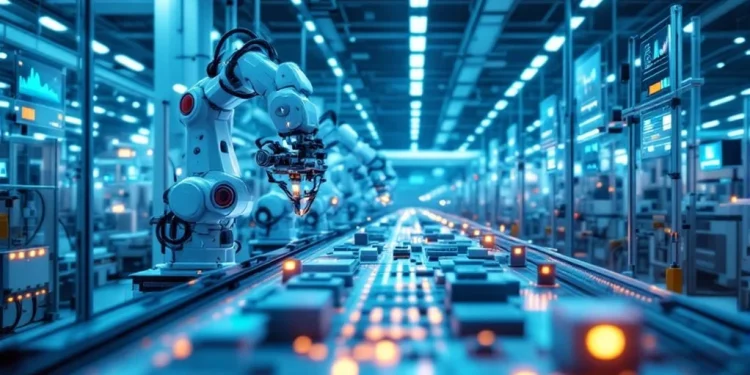AI in manufacturing uses advanced software and automation to improve how factories operate. It helps with quality control, maintenance prediction, and supply chain management through data analysis and machine learning. AI systems can spot defects, predict equipment failures, and optimize production schedules in real-time. With a current market value of $5.94 billion and growing rapidly, AI’s role in modern manufacturing continues to expand with new innovations.

Artificial intelligence is transforming the manufacturing industry at a rapid pace. In 2024, 35% of manufacturing firms are using AI technologies to improve their operations, with over 70% having implemented some form of AI solution. The global AI manufacturing market, valued at USD 5.94 billion in 2024, is expected to grow considerably, reaching USD 230.95 billion by 2034.
AI’s impact on manufacturing is most visible in predictive maintenance, where it reduces maintenance costs by up to 25% and unexpected downtime by up to 30%. Machine manufacturers are leading this trend, with 90% investing in predictive analytics to keep their equipment running smoothly. These systems use data from sensors to detect potential problems before they cause breakdowns. Improved efficiency has been reported by 44% of manufacturers using AI solutions.
Predictive maintenance powered by AI slashes costs and downtime while helping manufacturers stay ahead of equipment failures through smart sensor monitoring.
Quality control has also been enhanced through AI technology. Computer vision systems can spot defects in real-time, making automated inspections more accurate than ever before. This technology works alongside human operators to guarantee products meet quality standards consistently. With data cleansing being crucial for optimal performance, manufacturers invest heavily in maintaining data quality for their AI systems.
Furthermore, 41% of manufacturers use AI to manage their supply chains, analyzing complex data to improve logistics and inventory control.
The adoption of AI varies by company size. Larger manufacturers with revenues over USD 10 billion show a 30% adoption rate of generative AI, while smaller companies with revenues between USD 500 million and USD 10 billion have a 10% adoption rate. Generative AI is particularly useful for product design and innovation, with the market expected to reach USD 10.5 billion by 2033. The medical devices sector is experiencing substantial growth as healthcare development drives AI implementation in manufacturing processes.
Manufacturing companies choose between on-premises and cloud-based AI solutions. On-premises solutions currently dominate with 57% of the market share, as companies prefer having direct control over their systems. Cloud-based deployments account for 43%, offering flexibility and scalability for businesses that need it.
AI in manufacturing isn’t limited to production processes. It’s also being used for employee training and workflow optimization. The technology helps workers learn new skills and understand complex procedures through interactive training programs.
AI systems can analyze production data to suggest improvements in workflow efficiency and resource allocation.
The future of AI in manufacturing looks promising, with a projected compound annual growth rate of 44.2%. This growth is driven by continuous improvements in AI algorithms, increased sensor technology integration, and the growing need for automated solutions in modern manufacturing facilities.
As these technologies become more accessible and refined, they’ll continue to reshape how products are designed, made, and delivered.
Frequently Asked Questions
How Much Does It Cost to Implement AI Systems in Manufacturing?
AI implementation costs in manufacturing typically range from $60,000 to $500,000, varying based on factors like custom development needs, infrastructure requirements, data complexity, and integration with existing systems.
What Cybersecurity Risks Come With Ai-Powered Manufacturing Systems?
AI-powered manufacturing systems face risks from legacy system vulnerabilities, adversarial attacks, data poisoning, interconnected device exploitation, and compromised intellectual property, leading to potential financial losses and reputational damage.
Can Small Manufacturers Benefit From AI Implementation?
Small manufacturers can benefit considerably from AI through increased efficiency, reduced operational costs, improved quality control, predictive maintenance, and supply chain optimization, despite facing initial implementation challenges.
How Long Does It Take to Train Staff on AI Manufacturing Tools?
Training duration varies from weeks to months depending on tool complexity, prior staff knowledge, and chosen training methods. Personalized AI learning platforms and interactive approaches can accelerate the process considerably.
What Regulations Govern the Use of AI in Manufacturing Facilities?
Manufacturing facilities must comply with state and federal AI regulations, focusing on worker safety, data privacy, risk assessment protocols, and machine operation standards while following industry-specific compliance requirements.


